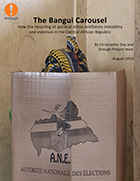
This blog contains excerpts from the full report. Click here to read or download the full report.
Today, the Enough Project released its latest report, The Bangui Carousel. In it, authors argue that the recycling and maintenance of a small group of elites—regardless of leadership at the top—combined with the absence of effective state institutions is a fundamental feature of government in the Central African Republic (CAR), and addressing that system is critical to combatting the structural roots of the country’s persistent instability.
“It is time to bring the Bangui Carousel described in this report to an end. On the Carousel, elites cycle through regime after regime within a system marked by weak governance structures that enable these elites to exploit their positions for personal benefit. President Touadéra and the international community must learn from these lessons of the past and institute reforms that ensure a more transparent and accountable structure, one that can finally govern for the benefit of all the people.” – Brad Brooks-Rubin, Director of Policy at the Enough Project
In February 2016, current President Faustin Archange Touadéra was elected, marking a possible new beginning for CAR and opening a moment of hope that the country could find a path toward stabilization. Encouraging signs, such as the endorsement of Touadéra by political opponents, indicate the possibility of a positive trajectory for CAR.
However, the country is still a long way from stability. Armed groups and criminal gangs continue to destabilize the countryside, controlling valuable mining areas and commercial towns. More than 2 million people, or half of the country’s population, are experiencing hunger; close to 415,000 people remain internally displaced, and 467,000 refugees are only slowly trickling back.
The report asserts why, if policymakers fail to address the structural issues that led to the crisis in CAR, the country is likely to repeat its violent past. The Bangui Carousel notes how successive rulers in CAR have maintained authority largely by centralizing control where possible, and extended personal rule by dispensing patronage in return for political support, in particular by personally appointing to senior posts those who served in previous governments or trusted family members.
“The people do not trust the politicians and the transitional government; they are all the same. The political elite have power and money, but all they do is to put their own friends and family in front of the population.” – Local Civil Society Leader, Bangui, July 2015
To illustrate patterns of elite recycling, the term “Bangui Carousel” embodies the pattern of appointments to government ministries since early 2013. The authors developed an overview of the members in each government and their inter-connections, followed by an analysis of some of the individuals who have participated in or benefited from the Bangui Carousel – how groups and individuals gain access and benefit from the system at the expense of CAR’s citizens.
To disrupt, and eventually stop, the entirety of the Carousel, the report asserts that accountability and effective governance must exist in CAR. A way forward to accomplish this in part is addressed in the report’s recommendations, detailed more fully in the paper itself:
- The CAR government must establish robust and independent anti-corruption institutions
- The CAR government must prioritize transparency in natural resource revenues, contracting, and spending to prevent corruption – working with donors and international institutions for assistance.
- The U.N. Security Council, U.S. Government, and European Union should impose targeted sanctions and strengthen enforcement against those who undermine peace
- The CAR government, United States, European Union, and the U.N. Multidimensional Integrated Stabilization Mission in the Central African Republic (MINUSCA) should ensure that the restart of the Kimberley Process (KP) prevents the flow of conflict diamonds and that voices of Central African civil society are included at all stages of the KP decision making process in CAR.
- The Extractive Industries Transparency Initiative (EITI) process should restart in CAR; when fully implemented, the EITI can help to to make resource revenues more transparent.
- International donors such as the U.S. government, the European Union, and the World Bank should work to strengthen the judiciary in CAR and promote Special Criminal Court prosecutions.
- The new CAR government and international institutions should help improve capacity and safeguards for civil society and the media.
- The CAR government should reform the government appointment process.
Click here to read or download the full report.

